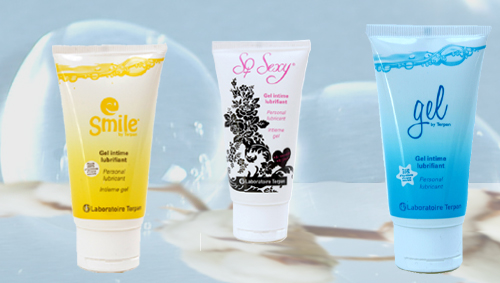1 / The silicon-based lubricants: on every condom, there is already a lubricant made of silicon. Silicons are a very large family of products whose viscosity can vary from that of water to that of a solid. Some are known to provide an incomparable slippery and especially they do not dry. Silicons have names ending in general by-one (dimethicone, cyclomethicone …). The medical grade and cosmetic grade silicone are completely inert, that is to say they do not cause allergic reaction, irritation, burning, etc. ….
It is therefore natural that we can recover these silicons in intimate lubricants: they contribute significantly, associated with glycerin, to the lubricating property of the gel and are compatible with male and female condoms. They can be colored and flavored. They are, by cons, not edible.
Silicones can be a lubricant alone or be blended with other components such as water or glycerin, as in our No Limit lubricant, Smile brand.
2/ Water-based lubricants: they are said “watery” or “aqueous”, they represent a large share of lubricants on the market. These lubricants can be formulated as gels fairly consistent and which do not flow, or rather much more fluid so they can be packaged in bottles or tubes. They usually contain more than 80% water and can also be colored and flavored. They may be edible but this must be clearly indicated on the packaging. If in doubt, do not eat, it is better to take precautions.
Water-based lubricants can be organic (Yes ! it also exists in this domain ! ) : This requires that most constituents are considered organic and that the product bears a label of a bio standard.
Water-based ubricants are compatible with condoms, male or female. They can also be used without a condom, for vaginal dryness, for example, or just to improve comfort.
3 / Glycol-based lubricants: These products are generally sold as “massage oil compatible with condoms.” These are very slippery lubricant, with oily texture but it’s not oil. Glycols are synthetic materials that, for some, can have the property to give a warm effect. When you blow on the skin soaked in these materials, a heat sensation appears. Glycols are the base for heating lubricants. Therefore, be careful, they are not for everyone, some people may not support this and feel irritation or burns. The glycols may be components of gels in water or silicone.
4 / Oil-based lubricants: Be careful, they are not compatible with condoms! By cons, mostly are known to be used on mucous membranes to improve sexual lubrication. These are the massage oils or other intimate lotions, petroleum jelly, butter, margarine, oils, baby …..
5 / The other intimate products: Sometimes, doctors can prescribe medication remedies to cure a disease, improve vaginal dryness and bring hormones. In this case, it is important to ask your doctor or pharmacist if the product is compatible with the use of latex condoms. If in doubt, do not use them simultaneously. These products are not necessarily regarded as lubricants.



